UCCS Community
- Current Students
- Faculty Staff
- Alumni & Friends
- Parents & Families

Schools and Colleges
- College of Business
- College of Education
- College of Engineering and Applied Science
- College of Letters, Arts & Sciences
- College of Public Service
- Graduate School
- Helen and Arthur E. Johnson Beth-El College of Nursing and Health Sciences
Quick Links
- Search for Programs & Careers
- Academic Advising
- Ent Center for the Arts
- Kraemer Family Library
- Military and Veteran Affairs
- myUCCS Portal
- Campus Email
- Microsoft 365
- Mountain Lion Connect
- Support Network: Students
- Support Network: Faculty
- Account Help
Department of English
COLLEGE OF LETTERS, ARTS & SCIENCES
- About Faculty & Staff Recent News Upcoming Events
- Academics Courses First-Year Rhetoric & Writing Internships Scholarships
- Research & Initiatives
- Resources Future Students Current Students Faculty & Staff Alumni & Community
ENGL 1410 Themes
About the course.
In ENGL 1410, you’ll learn a rhetorical approach to inquiry, research, and academic argument.
In this class, you’ll analyze a variety of sources to understand a complex issue of your choosing related to the course theme. You can expect your ENGL 1410 class to be small (20 or fewer students), to work with technology throughout the course, to learn to efficiently use library resources, and to have one-on-one attention from your instructor.
You’ll spend most of the semester exploring the topic of your research, selecting and evaluating source material, and crafting your own well-reasoned argument. You’ll use a rhetorical methodology called stasis theory to research your topic and develop a thoughtful, academic argument about it.
Each ENGL 1410 instructor selects a course theme, and student research relates to the course theme in some way. This page lists and provides information about the themes taught by individual instructors. Look for an instructor’s name in the course schedule (in your student portal) while you are registering for courses.
ENGL 1410 is primarily offered in Spring semesters, so there is a wider selection of teachers and themes offered in Spring. A small number of 1410 sections are offered each Fall and Summer semester.
Contact the Director of the First-Year Rhetoric and Writing Program, Dr. Ann Amicucci ( [email protected] ), or the instructor with questions.
The Dark Side of Immigration
Gina baldoni-rus.
The United States is a country founded by immigrants. Our ancestors arrived on our shores in search of the promises of the “American dream.” We are often referred to as a “melting pot” or a “mixed salad” of people, cultures, and traditions. Immigrants have built our land, defended our country, invested in our economy, and strengthened our families and communities. They are our grandparents, parents, professors, doctors, and neighbors. Our history is enriched by immigration; nevertheless, the United States has also had a complicated and conflicted history with immigration. In every era of U.S. history, immigrants have been the subject of much criticism and the topic of heated debates.
Especially in recent years, the focus of discussions has turned to issues of deportation, detention, criminal and illegal aliens, exploitation, nativism, and violence at the border. Our exploration of immigration will engage issues of the “dark side,” including immigrant gangs, smuggling, and the trafficking of humans and drugs. Who are these immigrants, and how, if at all, are they involved? What’s really happening at our borders and in our very own cities? How do scholars, researchers, and filmmakers problematize these issues? Join us to discover the versions of truth.
Rhetoric of Exclusion
Michael ferguson.
Our country is founded on the idea of “Liberty, Justice, and Freedom for all,” and yet, there were centuries of slavery. There is no mention of the “peculiar institution” in our constitution, and yet it existed, and still touches every aspect of American life and politics. In industries like modeling, we see people of similar shapes and builds without companies mentioning exactly the type of appearance for which they’re looking. States, Cities, and neighborhoods across the country have places called “China Town,” or a “bad side of the tracks,” and society seems to accept these as naturally occurring phenomena with no explanation of how they came to be. We walk through life without thinking of who might be excluded, but if we stop to think about who gathers in the rooms we occupy, who lives on the streets we call home, who is on the TV shows we enjoy, there exists a reason and explanation for why and how these things came to be. In this 1410 class we will explore how exclusion is made acceptable and codified without ever mentioning who or what we want to be absent.
Web and Wilderness: Digital and Natural Realities
Sheldon gaskell.
Some believe we may be living double lives: who we are online often differs from our physical, "flesh and blood" selves. How have our identities as humans changed with the advent of the Internet, especially in our post-pandemic experience? How do we balance living with one foot on tangible ground- grass between toes, sun on face- and the other in the abstract coded web of cyberspace?
In this research writing course, we will explore our relationships with digital and natural environments to better define who we are as people in this multi-faceted world. We will read texts, discuss issues, and define concepts involving social media, digital technologies, artificial intelligence, and cultural representations of computer realities as well as how they exist alongside in-person communication, "nature," wilderness, and life in physical environments. Students will learn stasis theory as a research process and apply techniques in rhetoric to construct a wide range of texts that may include podcasts, video essays, webpages, maps, an annotated bibliography, literature review, researched argument essay, and more. Students are highly encouraged to examine topics relevant to their majors, careers, or interests involving this theme. This course invites us to be mindful of our places in this world and how our identities are shaped by these natural and digital forces.
Artful Questions: Inspired Research
Catherine grandorff.
From the youngest child to the oldest elder, anyone can be affected by art. On occasion, art may serve as a prompt for reflecting on life, the human experience, or any number of topics. "Artful Questions" considers how various kinds of art can foster such inquiry and ultimately facilitate research. Upon contemplating selected works, we'll engage queries like "How can we define art? How does art shape our surroundings, or vice versa? What impact might a piece have on the world? What is the value of different kinds of art?" This class invites you to blur the line between curiosity and research to cultivate a practice that enhances both.
Wellness: Writing in the Health Sciences
Phillip haisley.
In this course, students will study the idea of “wellness” as it relates to themselves, college life, and beyond. Students will read and discuss central course texts on physical, mental, and emotional wellness. Students will begin the semester by writing a brief report-style paper on the wellness of college students. This report will use a mix of sources provided by the instructor and sources students collect on their own. Next, the students will undertake an in-depth research project on a topic of their choosing (related to wellness). Students will collect a mix of 16 scholarly and popular sources on the topic, take detailed notes on their sources, complete a literature review, and conclude with an argumentative paper using the sources they have collected. Since the course is targeted at health professionals, papers will be written in APA format and special attention will be given to relevant genres used in the field of health sciences.
New Technologies: Friend or Foe?
Keri hemenway.
New technologies are popping up every day: from water cleaning tech to medical science to AI. This class will explore the many technologies that affect Americans today. Are they worth the benefits, or do they create new detriments to the way we live and work as Americans?
This writing course teaches critical thinking through research, argument, and science literacy. During the semester, you will explore a specific subtopic of your choice in science, using mostly peer-reviewed, scholarly research to develop a rhetorical analysis, literature review, and a critical argument essay.
Presently, the topic of science itself stirs controversy. Reasonable scientists understand that science is reliable and logical, imperfect and constantly improving, and makes no promises that it cannot realistically achieve. However, sensationalism and ‘manufactured rage’ in the news media, social media, popular culture, and politics have grossly distorted science, causing much mistrust in the public. With such in mind, this course encourages intellectual humility to help you develop a wise approach to your science topic, using quality evidence and disciplined thinking.
Crime and Punishment
Chelsea lawson.
How does modern society classify crimes? Why are some actions that are technically illegal largely viewed as morally acceptable, such as stealing food to feed one’s family? Should society prosecute those actions in the same way as other crimes? How does society justify some killings and not others? How do we appropriately punish those who commit crimes? Are the mentally ill capable of receiving equitable treatment in the justice system? What are some of the issues that plague the justice system and prevent it from being efficient and truly just? There are just a few questions we will explore as we navigate the topics of crime and punishment. There exists a great deal of contention on how to treat those we deem criminal and how to define “criminal” appropriately. This course seeks to explore various attitudes towards crime and punishment through a rhetorical lens. We will examine our modern society’s reaction to and definition of what constitutes criminal action and justice, how definitions have evolved over time, what has impacted this shift, and how shifting attitudes have impacted our culture as a whole.
Public Sounds, Sounding Publics
Chris martin.
While honing our academic research-writing skills, we’ll think about how we inhabit, engage, and shape the soundscapes we encounter daily. This course will consider topics out of the interdisciplinary field of sound studies, which encompasses such off-beat explorations as
- 1970s ear-cleaning exercises that don’t involve a Q-tip
- antique sound technologies like the laugh box
- speculative sound technologies like the cat piano
- the soundscapes of the sewer, the car, and Guantanamo Bay
- cassette tapes as radical community-building
- therapeutic silence and the history of the stethoscope
- vocal fry, upspeak, and the politics of noise
In addition to the standard (written) academic research paper, students will also have the option to present their research findings in the form of an audio essay, taking as their model some of the podcasts and sound documentaries we’ll encounter during our foray into sound studies.
Sports Rhetoric
Omar montoya.
Sports—be it basketball, baseball, golf or soccer—are a powerful industry that has diverse if controversial implications for regional, national, and global culture and identity: Be it the U.S. Women’s National Soccer team and their fight for equal pay, the United Nations’ use of sports as a development and gender equity tool, or current legislative debates around trans athletes’ rights, football players' mental health and CTE, or the debate on college athlete “pay for play.” Sports are helping to grow economies, drive policy, and change society but are often overlooked, as a “commonplace” for local, regional, national, or global politics. This course will combine analysis, argument, and research skills—through the lens of Stasis Theory—to assist students in constructing an original persuasive argument on their sports-related topic of choice and its rhetorical, social, and cultural impact.
Nathan Price
It is often argued that the best way to avoid being a victim of propaganda is to study propaganda. It is through this purpose that we examine the use of propaganda in historical and social events. We analyze these events for the use of rhetoric, the manufacturing of messages, and the formation of in-groups and out-groups. We look for timeless patterns, techniques, and strategies that allow communicators to craft messages that seek to manipulate people's emotions, in hopes that we can become more skillful, compassionate, and contentious rhetoricians ourselves.
Cash Rules: The Rhetoric of Money, Cost, and Value
Michelle prose.
For many, a cash-benefit-analysis is the first step in making any decision because money and finances dictate many of our behaviors and our beliefs. Apart from the actual study of economics and business, rhetoric plays a significant role in the way money, cost, and value is assessed, negotiated, and controlled in our society and in our lives. In this course we will examine the way money affects everything around us, for better and for worse.
Humor and Comedy
Leslie rapparlie.
Taylor Tomlinson. Trevor Noah. Ali Wong. Nate Bargatze. These comedians have all come to fame by providing people with one of the pleasures of life: humor and comedy. But to what end do people use humor? Why does jest have such an impact on humanity and how can understanding that help us? This course allows students to investigate humor, comedy, and laughter through a variety of academic lenses. Students research and analyze topics such as political satire, popular cartoons, stand-up routines, comedians, ethnic and cultural humor, sit-coms, YouTube antics, humor and yoga, bloopers, vaudeville, The Simpsons, South Park, Family Guy, The Daily Show, film, video, comic books, and more.
Beasts of Mind: The Sociopolitics of (De)Humanization and Animalization
Christine robinson coon.
You might be a fan of science fiction or the zombie genre; or you might be interested in ethics, social politics, or the power of language; or perhaps you ARE a member of the undead or another kind of “beast” in need of social justice. If any of this applies to you, register for this theme because this course explores how and why our society’s definition of "humanness" is entangled with our constructions of Others including minorities, animals, aliens, cyborgs, and zombies. In essence, this theme examines the making of a beast—those considered less than human.
Mental Health Matters: A Research Initiative
Kristen robinson.
This course utilizes argumentative and research-based inquiry to delve into the topic of mental health. Oftentimes, mental health is viewed as a binary; you are emotionally healthy or you’re not. You are ill or you are well. You have a mental illness or you don’t. We'll deconstruct this binary to ask: What is normal? And how do we, as humans, experience mental health? Initially, you'll read, evaluate, and integrate sources to enhance your knowledge of analytical and rhetorical practices in classical stasis theory. You'll then apply this theory to explore complex issues within mental health, including looking at your own emotional hygiene and mental health practices.
Playing Life: The Role of Games
Games teach us about being human and about having fun. They are one way we learn to interact. Games help us develop strategies for handling problems, successes, and failures. Game theory influences everything from education to economics, and games can shape the ways we think, behave, and operate in the world. In this class we’ll play games and we’ll think about how games shape our personal lives and our culture. There are all kinds of games, and they influence all kinds of people; playing, discussing, studying, and researching games will help us to recognize their powerful influence.
American Music: Listening Our way to Culture and Identity
Martin salgado.
Our lives are intertwined with pop culture. Music specifically is an important vehicle which carries messages that are important and specific for each generation. We will read, analyze and discuss the importance of American music and its influence on culture and communities in America. We will explore queries such as: How does music define a generation? How can music represent a community? Or even, what is American music? We will explore the importance of music and how it helps us relate to our culture as a society and affects our personal identity. We will explore the sounds of Motown being blasted in 1960s Detroit, the sounds of war protest and division of generations in 1970s California, all the way to the online sounds of hip-hop and Lo-fi in the 21st century.
Metaphor and a Topic of Your Choice
Adrian shaw.
Metaphor and _______ . You fill in the blank! Because whatever it is you’re curious about—whether it’s astronomy, philosophy, consciousness, medicine, dreams, theology, music, rivers, technology, education, aliens, or time (or any other topic you could possibly be interested in!)—metaphor is a tool that can help us learn about that.
In our research projects, we’ll investigate the surprising (and often hidden) metaphors at the heart of our thinking and our experience of the world around us, revealing the extent to which metaphor necessarily shapes our understanding of the concepts and the questions we care about most.
A Rhetoric of Ordinary Objects
Nate siebert.
This is a course about ordinary objects, the medium-sized stuff of everyday life: things like mason jars and potatoes, crosswalks and parking spots, pockets and garbage cans. Ordinary objects have a way of fading into the background, of becoming parts of the landscape we don't pay attention to. But as Scot Barnett and Casey Boyle put it, "Things provoke thought, incite feeling, circulate affects, and arouse in us a sense of wonder. But things are more than what they mean or do for us. They are also vibrant actors, enacting effects that exceed (and are sometimes in direct conflict with) human agency and intentionality. Things are rhetorical, in other words."
In (other) other words, this is a course about bringing ordinary objects out of the background to see what they reveal not only about themselves but also about history, economics, and social and political life. We begin the semester with practice in reading about, writing about, and thinking about ordinary objects, then each student conducts a semester-long research project on an ordinary object of their choosing, using a deep investigation of that object to say something about the historical events, economic processes, and social and political conflicts the object brings into focus.
In ((other) other) other words, this is a course about things and about making things, mostly out of words.
Within and Beyond ‘Normal’: Inclusive Health and Wellness
Andrea wenker.
Notions of body and mind that inform our thinking about health and wellness often assume a universal normality that is now in question. In this course, students will explore viewpoints grounded in neural, hormonal, gender, physiological, and other diversities to discover new and more inclusive landscapes of health and wellness. For all students interested in the subject for its social, civic, or personal importance, and a good choice for those entering or considering a career in health sciences fields.
Exploring Local History
Delyn winters.
Journey back in time to the early days of Colorado Springs and the Pikes Peak region to examine historical issues from a fresh perspective. Students engage in inquiry through podcasts, audio and video recordings, lectures from local historians, original texts, and visits to local libraries and museums. What mystery still awaits an answer?
Veterans Programs and Resources
With five military bases in Colorado Springs, UCCS has a diverse military-affiliated population. In this research-based course, we will explore goods, services, and programs specifically designed for and by veterans. This is a service-learning course designed not only to introduce veterans to a variety of known and lesser-known programs available to them, but to use research skills to help connect these resources to other veterans and their families.

- Global resources


AQA A Level English Literature Specification A (legacy)
La5c: literary connections coursework, final coursework re-takes: january 2010.
These are texts that have produced interesting work for this unit. It is not an exclusive list nor are these 'approved' texts - candidates are free to select from the wide range of suitable works, as explained on the LA5C page . It is important, in addition, that the task is carefully focused - which is why both texts and tasks need to be approved in advance by your moderator.
Some texts have links to Amazon to provide you with more details, but as there are over 100 pairings here, completing this task will take some time! You can use the search box on the left to locate editions. Meanwhile, please send in any further suggestions of your own.
- Paradise Lost and Lord of the Flies (evil)
- Paradise Lost and Frankenstein
- Villette and Frankenstein (mother figures)
- Paradise Lost and Philip Pullman (anti-heroes)
- Cold Comfort Farm and Precious Bane
- Passage to India and Heat and Dust
- Tolkien and Pullman (fantasy novels' exploration of good and evil)
- The Wasp Factory and Lord of the Flies
- Catch 22 and Captain Corelli's Mandolin (heroes)
- Lolita and A Child Called It (the presentation of abuse)
- Mrs Dalloway and The God of Small Things
- The Return of the Soldier and Not So Quiet (Helen Zenna Smith)
- How to Be Good (Nick Hornby) and The Good Doctor (Damon Galgut) (the concept of goodness)
- Oliver Twist and The Jew of Malta
- Beloved and The Color Purple
- Nice Work and Hard Times
- The Waves and Ulysses (the presentation of the self)
- The Collector and The Lovely Bones (abductors and villains)
- The Collector and Frankenstein
- Jane Eyre and The Wide Sargasso Sea
- Roddy Doyle and poems by Seamus Heaney (childhood)
- The Cider House Rules and Up the Junction
- Nights at the Circus and Big Fish (Wallace) (magic realism)
- Nights at the Circus and A Streetcar Named Desire
- A Streetcar Named Desire and Wuthering Heights (relationships between men and women)
- Jane Eyre and Tulip Fever (Moggach)
- Oranges are Not the Only Fruit and A Room with a View
- The Crucible and The Scarlet Letter
- Tess of the D'Urbervilles and Esther Waters (George Moore) (the treatment of women)
- Top of page
- Legacy course
- Examination units
- AQA LA5C texts
- First World War
- Revision guide
- Romanticism
- New course (2008)
- Word of the day
- AQA A Level A
- Books for A Level
- Literature links
- Literary Drinkers
- Alan Bennett
- William Blake
- Carol Ann Duffy
- Michael Frayn
- Philip Larkin
- Arthur Miller
- Edwin Morgan
- Shakespeare
- R B Sheridan
- Oscar Wilde
- Teaching resources
Copyright 2008 © Literary Connections
- Student Life
- SUU Students Page
- SUU Faculty/Staff Page
- Alumni and Community Relations
- Mission Statement
- Department Programs
- Scholarships and Opportunities
- Student Conference Fund Request
- Kolob Canyon Review
- Sigma Tau Delta
- Writing Center
- Scriblerian Writing Contest
- Art of Literature Reading Series
- Fall 25 Lit Course Descriptions
- Writing Conference
- Faculty & Staff / Contact
ENGL 2010 Course Topics

Writing about Animals Instructor: Natalie Johansen

Writing about Fans and Fandom Instructor: Charla Strosser

Writing about Fantasy Instructor: Amber Hancock

Writing about Historical Fiction Instructor: Sonya Bishop

Writing about Monsters Instructor: Charla Strosser

Writing about Monsters Instructor: Alexis Taylor

Writing about Music Instructor: Tasha Seegmiller

Writing about Myths Instructor: Alexis Taylor

Writing about Queer Studies Instructor: Julie McCown

Writing about Science Fiction Instructor: Joy Sterrantino

Writing about Shakespeare Instructor: Jessica Tvordi

Writing about the Suburbs Instructor: Ryan Shoemaker

Writing about Sustainable Food and Culture Instructor: Marc Farrior

Writing about Time Instructor: Merry Gravett

Writing about Villainy Instructor: Chelsea Campbell

Writing about Video Games Instructor: Joy Sterrantino
All images are in the public domain or owned by Southern Utah University, unless otherwise noted in the topic description.
Department of English
- Meet our team
- [email protected]
- 435-865-8088
- On facebook
- On instagram
Writing about Animals
In this section we will explore the connection between humanity and animals and discuss how that connection has evolved over time. We will analyze viewpoints that challenge the established boundaries between people and animals, leading us to then challenge the ethics of our behavior toward animals. As we study these issues, students will learn how to use persuasive techniques to create their own research-based argument.
Writing about Fans and Fandom
Writing about fantasy, writing about historical fiction, writing about monsters.
Were you afraid of the monster under your bed? Do you love scary movies? Are you ready for the zombies to come? This section of English 2010 focuses on arguments about monsters and stories about monsters ranging from those told by the Greeks, medieval legend, classic movie monsters and urban legend and their connections to fear, identity, and culture. It should also provide you with perspective on the way cultures and people interpret values because monsters behave differently over time and across cultures.
Stories are integral to the human experience. Humans have told stories to explain the world and our own connections to it and each other since the beginning. In this class, we will explore the functions of mythological stories in our lives, including monsters, both literal and fictional, the role of the oral tradition in storytelling, the structure of the hero’s journey, and what makes someone a hero or a monster. This section of ENGL 2010 uses the themes and structure of mythology and the classification and definitions of mythical monsters to explore how stories play a role in our own lives and how we assign the “roles” of hero and monster and why. The major assignments build on one another to practice the skills of academic writing. Assignments include a flash memoir exploring our own personal connection with monsters, an argumentative paper defining what makes a monster, a detailed proposal/annotated bibliography, and a final 10-page research paper tracing the story of a “monster” from its creation and through the changes that occur with time and shifts in cultures/values, and more. Image: https://www.biodiversitylibrary.org/page/41862917#page/542/mode/1up
Writing about Myths
Stories are integral to the human experience. Humans have told stories to explain the world and our own connections to it and each other since the beginning. In this class, we will explore the functions of a myth, the role of the oral tradition in storytelling, the structure of the hero’s journey, and what makes a story a “myth”. This section of ENGL 2010 uses the themes and structure of mythology to explore the roles of stories in our lives and articulate how mythology is used to define the undefinable. The major assignments build on one another to practice the skills of academic writing. Assignments include a flash memoir exploring our own personal connection with myths, a short argumentative paper defining what makes a myth, a detailed proposal/annotated bibliography, and a final 10-page research paper tracing a mythical story or figure from its creation and through the changes that occur with time amd shifts in cultures/values, and more. Image: https://www.biodiversitylibrary.org/page/18065353#page/389/mode/1up
Writing about Music
Writing about queer studies, writing about science fiction.
This class discusses the genre of science fiction in literature, film, and television. Science Fiction is made up of stories that are beyond our known world or are an alternative to reality due to the plausible application of technology. Sci-fi is part of a broader genre called speculative fiction which includes dystopian and fantasy, both of which sometimes cross over with science fiction but are not the same thing. Our class will define what science fiction is (and isn’t) and the social and emotional influence it has. We look at its origins, how it has evolved, and how attitudes toward it have changed. We’ll read some short stories and even watch a couple of movies and shows. Students will be permitted to pursue their own interests and niches as they research and argue their perspective on sci-fi. It is not necessary to be versed in any science fiction to take this class.
Writing about Shakespeare
Writing about the suburbs.
Alcoholics. Domestic workers. Neo-Nazis. Stay-at-home moms. Depressed teens. Such is the cast of characters we’ll discover behind the façade of suburban decorum.
For many Americans, suburbia is where we situate our ambitions for upward mobility and economic security, our ideals of freedom, and our longings for social harmony and spiritual uplift. However, the reality of the suburbs is often quite different: cookie-cutter houses, despotic homeowner associations, keeping up with the Joneses, backbreaking mortgages, and xenophobia. Sadly, the promises and dreams of suburbia are often illusive and unrealized.
Exploring representations of the American suburbs from 1945 to the present, we’ll ask a number of tough questions: Is suburbia a classless place? Are there different types of suburbs? Who’s allowed into the suburbs and who’s kept out? Engaging a novel, a short story, films, and a play, as well as literary criticism and selected historical and sociological studies, we’ll attempt to answer these questions by examining a diverse range of suburban and urban spaces, from the white-collar suburbs of John Cheever’s “The Country Husband,” to the impoverished, cramped housing on Chicago’s South Side in Lorraine Hansberry’s A Raisin in the Sun, to the changing demographics and turf wars of Venice Beach, California, to the final glowing years of the placid Detroit suburbs in Jeffrey Eugenides’s The Virgin Suicides .
Writing about Sustainable Food and Culture
Writing about time, writing about villainy.
Ideas of “good” and “bad” are essential to how we function as a society and as individuals, but those concepts are also proportionally difficult to define. Who gets to decide who the villains and the heroes are? What happens when we disagree? Our definitions of villainy matter, but our reasoning does, too.
This section of ENGL 2010 uses pop culture and entry-level moral philosophy to explore who gets labeled a villain and why. Major assignments build on one another and include a paper defining villainy according to a specific moral philosophy, a detailed proposal/annotated bibliography, and a final 10-page research paper applying the “villain” label to a character, person, company, idea, or other entity–OR defending a “villain” in an attempt to clear their name.
Writing about Video Games
This class discusses gaming and gamers. Gaming is a multi-billion-dollar industry. With such a wide variety of games and devices available to users, our class will define what a game is and the social, physical, and emotional influence games have. We look at subjects such as addiction, sexism, and benefits in relation to gaming, as well as future technologies in the making. In addition, we look at specific games out there in relation to these topics, as well as watch Let’s Play and Streaming of others playing games and you’ll get to play a little bit yourself! Students will be permitted to pursue their own gaming interests and niches as they research and argue their perspective on games, gaming, and gamers. It is not necessary to be a gamer or know anything about gaming to take this class.
Your browser is not supported
Sorry but it looks as if your browser is out of date. To get the best experience using our site we recommend that you upgrade or switch browsers.
Find a solution
- Skip to main content
- Skip to navigation
- Macmillan English
- Onestopenglish
- Digital Shop

- Back to parent navigation item
- Sample material
- Amazing World of Animals
- Amazing World of Food
- Arts and Crafts
- Mathematics
- Transport and Communication
- Teaching Tools
- Sustainable Development and Global Citizenship
- Support for Teaching Children
- Vocabulary & Phonics
- Spelling Bee Games
- Phonics & Sounds
- The Alphabet
- Onestop Phonics: The Alphabet
- Alphabet Booklet
- Interactive Flashcards
- Warmers & Fillers
- Young Learner Games
- Stories and Poems
- Fillers & Pastimes
- Fun Fillers
- Ready for School!
- Topics & Themes
- Young Learner Topics
- Young Learner Festivals
- Festival Worksheets
- Art and Architecture
- Business and Tourism
- Geography and the Environment
- Information Technology
- Science and Nature
- Topic-based Listening Lessons
- Cambridge English
- Cambridge English: Preliminary (PET)
- Cambridge English: First (FCE)
- Cambridge English: Proficiency (CPE)
- Cambridge English: Advanced (CAE)
- General English
- News Lessons
Topics and Themes
- Beyond (BrE)
- Beyond: Arts and Media
- Beyond: Knowledge
- Go Beyond (AmE)
- Go Beyond: Arts & Media
- Go Beyond: Knowledge
- Impressions
- Macmillan Readers
- A Time to Travel
- Life & School
- Skills for Problem Solving
- Digital Skills for Teens
- Support for Teaching Teenagers
- Games Teaching Materials
- Business and ESP
- Business Lesson Plans
- Business Skills Bank
- Business Top Trumps
- Elementary Business Lessons
- HR Management
- Let's Talk Business
- Business News Lessons
- ESP Lesson Plans
- Career Readiness
- Professional Communication Skills
- Cambridge English: Business (BEC)
Everyday Life
Celebrations.
- Live from...
- Live from London
- Discussion Cards
- Writing Lesson Plans
- Life Skills
- Support for Teaching Adults
- Vocabulary Lesson Plans
- Language for...
- Vocabulary Teaching Materials
- Macmillan Dictionary Blog
- Vocabulary Infographics
- Kahoot! Quizzes
- Blog Articles
- Professional Development
- Lesson Share
- Methodology: Projects and Activities
- Methodology: Tips for Teachers
- Methodology: The World of ELT
- Advancing Learning
- Online Teaching
- More from navigation items
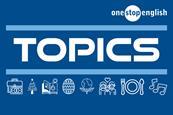
Topics: How to use the lessons
Adrian Tennant introduces a new series of integrated skills lessons based on a mix of common coursebook topics.
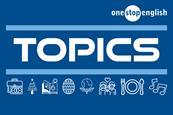
Topics: Easter
Introduce your students to the topic of Easter while they practice reading, listening, and speaking.
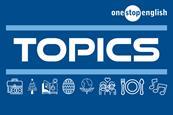
Topics: Christmas
Use this jolly instalment of Adrian Tennant’s popular series and get your students into the holiday spirit.
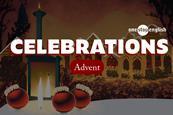
Celebrations: Advent
In this lesson, available at two levels, students learn about celebrating Advent in Germany.
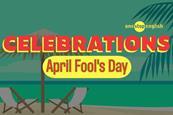
Celebrations: April Fool’s Day
Prank your students this April Fool’s Day while they practise geography-related vocabulary with this text about a fake dream island.

Celebrations: Canada Day
In this lesson, students learn about Canada Day and do related activities.
All Celebrations
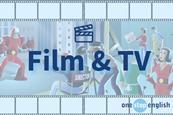
Film and TV: Sci-fi movies
In this lesson, students will have the opportunity to practise their speaking and listening skills while learning new vocabulary related to science fiction movies.

Film and TV: Crime series
In this lesson, students practise speaking, listening and using new language about television crime series and crime in general.
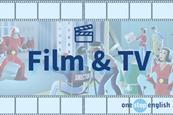
Film and TV: Nature documentaries
In this lesson, students practise speaking, listening and using new language about nature documentaries.

Everyday life: In the kitchen
In this lesson, students do a class survey about breakfast and write a recipe.

Everyday life: Night and day
In this lesson, students will do a questionnaire about sleeping and read about sleep.
Everyday life: Describing your area/neighbourhood
In this lesson, available at two levels, students describe changes to an area they live in (or know well).
All Everyday Life
RELATED CONTENT
Topics and themes - teenagers, guardian news lessons, join onestopenglish today.
With more than 700,000 registered users in over 100 countries around the world, Onestopenglish is the number one resource site for English language teachers, providing access to thousands of resources, including lesson plans, worksheets, audio, video and flashcards.
- Connect with us on Facebook
- Connect with us on Twitter
- Connect with us on Youtube
Onestopenglish is a teacher resource site, part of Macmillan Education, one of the world’s leading publishers of English language teaching materials.
- Privacy Policy
- Cookie policy
- Manage cookies
©Macmillan Education Limited 2023. Company number: 1755588 VAT number: 199440621
Site powered by Webvision Cloud

IMAGES
COMMENTS
Teachers should think about themes that would appeal to the freshman student audience and help students achieve the course outcomes. In the past, EN 102 courses were assigned one of five broad themes.
Each ENGL 1410 instructor selects a course theme, and student research relates to the course theme in some way. This page lists and provides information about the themes taught by individual instructors.
All English 102 sections teach archival, qualitative, and secondary source research and writing. All English 102 sections require 2 textbooks, Rhetoric of Inquiry, 5th edition, and The Writer’s Harbrace Handbook, 6th edition.
These are texts that have produced interesting work for this unit. It is not an exclusive list nor are these 'approved' texts - candidates are free to select from the wide range of suitable works, as explained on the LA5C page.
Course topics for ENGL 2010 at Southern Utah University and the professors who will instruct you depending on the class.
Overview of what you need to do for coursework. 2) Step 1: choosing a genre. 3) Step 2: doing an initial outline of your coursework. 4) Step 3: research and how to use your style models. 5) Step 4: planning & writing 1. st. drafts of your 2 pieces. 6) Step 5: First draft of commentary - do’s and don’ts. Y12: starting your coursework 9EN0 04 ...
Overview of what you need to do for coursework. 1. Choosing a topic/theme and texts. 2. What kind of texts can I produce? 3. Guidance on fiction and non-fiction. 4. Check an initial outline with your teacher. 5. Do the research and think about how to use your stimuli texts/style models. Y12: starting your coursework 9EL0 03 August 2020 2
examples of coursework titles that have been effective. They compliment the suggestions offered in the specification, coursework guidance, student exemplars and examiner reports.
With more than 700,000 registered users in over 100 countries around the world, Onestopenglish is the number one resource site for English language teachers, providing access to thousands of resources, including lesson plans, worksheets, audio, video and flashcards.
More specifically, themes best serve a section of 101 when they are characterized by two particular features: 1. They provide a springboard for more expansive, general reflection about writing, about language, and about texts. They provide insights into the essential business of the course, which is student prose and its improvement.